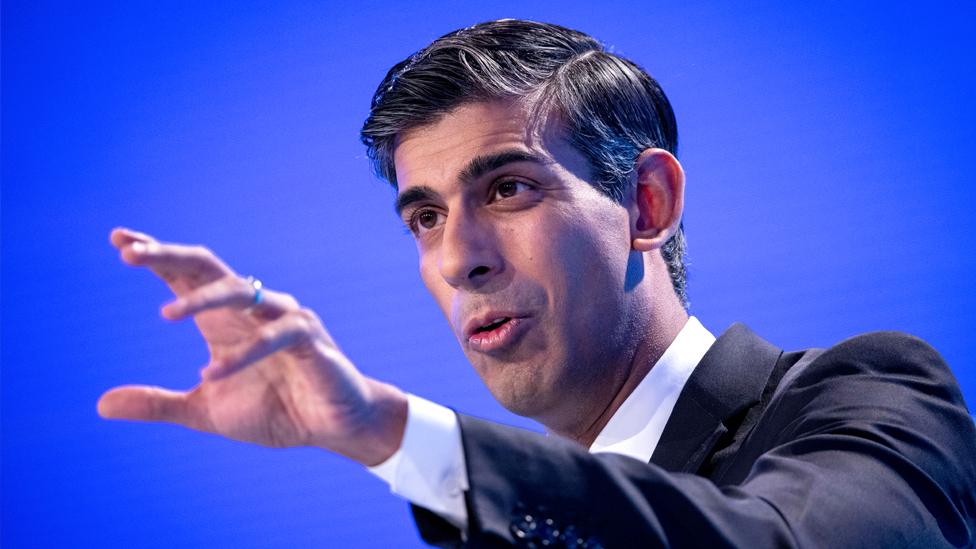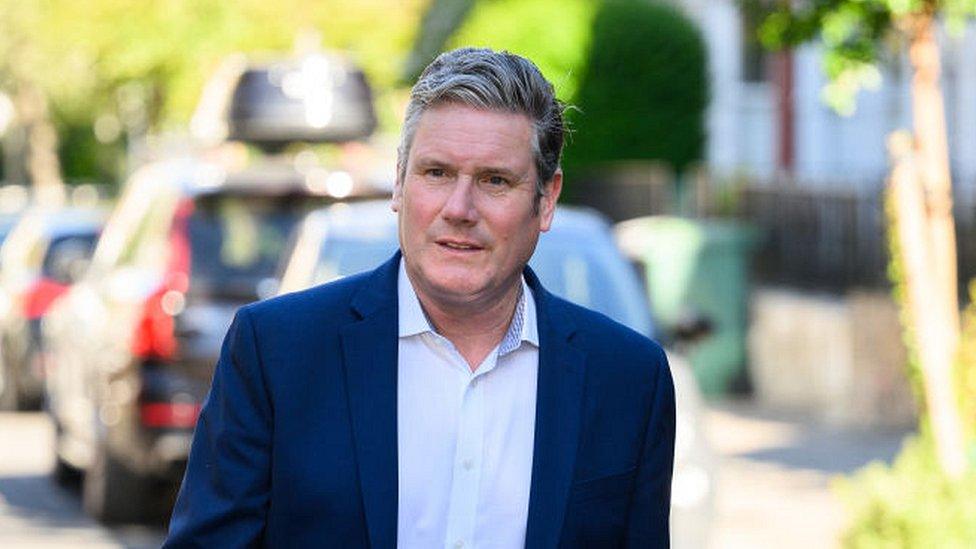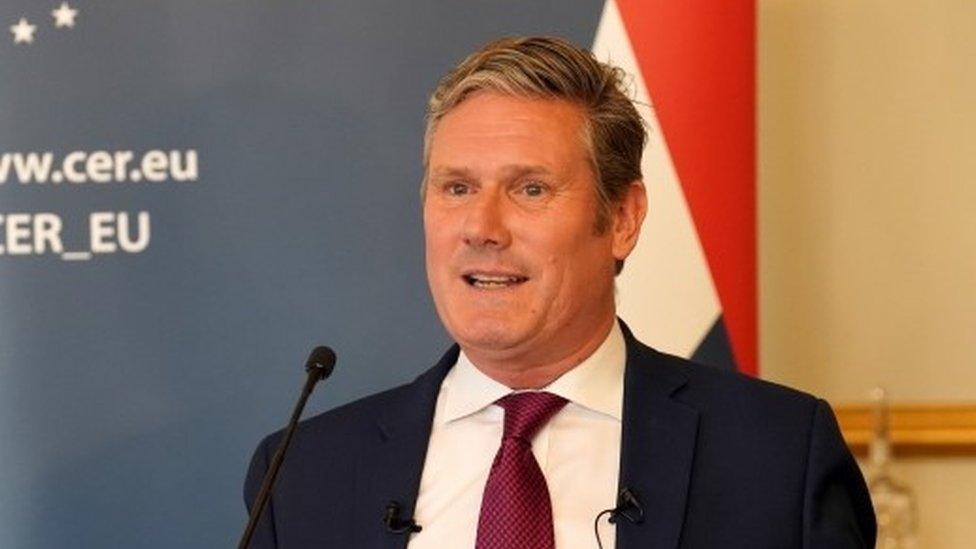We must wean economy off immigration, Labour leader warns businesses
- Published
Sir Keir claims government keeps having "sticking plaster" answers to problems, rather than looking to the longer term.
The days of "cheap labour" must end to wean the UK off its "immigration dependency", Labour leader Sir Keir Starmer has told business leaders.
Sir Keir called for a plan to train British workers and move the economy away from its "low-pay model".
But he accepted the need for skilled foreign workers and promised a "pragmatic" approach to immigration.
He later refused to commit to lower immigration overall, saying he was against a "fixed number".
Speaking to BBC political editor Chris Mason, he said under his approach levels would come down "in some areas" - but added: "I don't want to hold back the skills that we need in this country.
"Over the last few years, we've had arbitrary figures plucked out of the air, and that hasn't worked for anyone," he said.
The Labour leader's speech to the Confederation of British Industry (CBI) conference comes at a time when businesses are calling for more migrant labour to boost economic growth.
His address to business figures in Birmingham followed that of Prime Minister Rishi Sunak on Monday.
Mr Sunak told business leaders having "proper control of our borders" was one of the immediate benefits of Brexit and said curbing illegal migration was the "country's number one priority right now".
He spoke after CBI director-general Tony Danker said the UK needed more foreign workers to drive economic growth as the country faces a deep recession.
"People are arguing against immigration - but it's the only thing that has increased our growth potential since March," Mr Danker said.
There was considerably less migration during the Covid-19 pandemic than in previous years and the number of EU citizens moving to the UK has dropped since the UK left the European Union.
The Office for Budget Responsibility, external has forecasted a decline in net migration, with the number expected to settle at 205,000 a year from 2026 onwards.
Brexit is "already delivering” benefits and opportunities for the UK, the prime minister says.
In his speech, Sir Keir set out what the UK's immigration policy would look like under a Labour government, should the party win the next general election.
He promised an immigration system that works better for the needs of business and recognises the need for skilled workers from abroad.
But he stressed that any changes to a points-based migration system "will come with new conditions for business".
"We will expect you to bring forward a clear plan for higher skills and more training, for better pay and conditions, for investment in new technology," he said.
"But our common goal must be to help the British economy off its immigration dependency. To start investing more in training up workers who are already here."
Pressed on whether he wanted net migration to decrease, Sir Keir said he expected numbers to fall in areas that have been "overly reliant" on workers from abroad.
However, he added that he didn't want to hold businesses back if they need to employ talent from abroad.
Sir Keir also said he would tackle NHS waiting lists and improve mental health support in order to help people get back into work.
"You can't tell me the number of older people falling out of work has nothing to do with the millions stuck on NHS waiting lists," he told the conference.
Since the pandemic, one million people, mostly in their 50s, have left work making it harder for employers to find staff.
Sir Keir outlined Labour's plans for reform including:
Ensuring all employers able to sponsor visas are meeting decent standards of pay and conditions
Speed up visa delays to avoid labour shortages damaging the economy
Introduce training and plans for improving pay and conditions for roles that require international recruitment
Reforming the Migration Advisory Committee to project future trends more accurately
Asked if his own party supported the policies, Sir Keir said Labour had "changed" adding: "We've turned Labour inside out."
Sir Keir spoke about immigration in an interview with the BBC last week, saying the UK was recruiting too many people from overseas into the NHS.


Labour's leader appears to have a genuine belief that this is the best way to build sustainable economic growth.
Keir Starmer believes, we are told, that there needs to be a fundamental rethink that involves training the domestic workforce rather than relying on immigration.
But there is a political calculation too.
Sir Keir wants to persuade the old Labour heartlands which voted for Brexit that he understands some of the concerns about high levels of immigration.
He also wants to try and convince them he is serious about making Brexit work - without freedom of movement.
But not everyone in the Labour Party will agree with the tone or the substance of his speech.

The rise of legal migration to the UK was one of the most prominent political issues in the country ahead of the EU referendum in 2016.
Former Conservative Prime Minister David Cameron once promised to get immigration down to the tens of thousands a year.
Net migration - the difference between people coming to the UK and those leaving - has been over 200,000 since the late 1990s.
Under Sir Keir's leadership, Labour has ruled out a return to the EU single market, which guarantees citizens of member states the freedom to live and work anywhere in the bloc.
Labour's policy on Brexit has divided the party, with some calling for a much closer relationship with the EU on different terms.
Sir Keir's speech comes as Mr Sunak denied that ministers could look to realign the UK with EU laws.
Some Tories have been angered by suggestions the government was weighing up a Swiss-style relationship with the EU.
But the prime minister told the CBI conference on Monday that the UK "will not pursue any relationship with Europe that relies on alignment with EU laws".
Related topics
- Published21 November 2022

- Published4 July 2022

- Published4 July 2022
